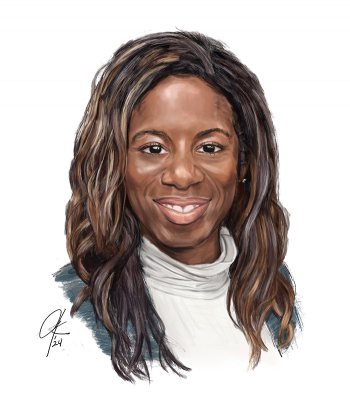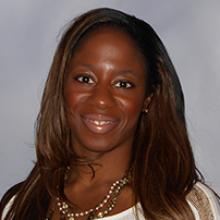Meet the Expert: Dia Jackson

Dia Jackson supports states, school districts, and educators with multi-tiered systems of support and special education best practices. She has written numerous special education resources for educators and serves as an expert advisor with Understood (formerly the National Center for Learning Disabilities).
Position: Senior Researcher
Areas of Expertise: Special education, equity, multi-tiered systems of support
Years of Experience: 20
Q: What piqued your interest in special education?
Dia: I’ve always wanted to work with children, especially children placed at risk. I originally planned to be a child psychologist, but as an undergraduate at the University of Virginia, I stumbled across a program that allowed me to earn my master’s in teaching while gaining my bachelor’s in psychology, and it sucked me in. Though I graduated with a master’s in teaching special education, I never intended to become a teacher—based on my school experience, I did not like teachers or school growing up! But I always wanted to help young people on the margins, those that other people counted out.
Q: Why did you dislike school growing up?
For so long, students of color and students with disabilities were intentionally excluded from our education system, and unfortunately, we’re still working within many of the systems that created those inequities.
Dia: I grew up in the suburbs of Washington, D.C., where I was often one of few Black children in the classroom. Teachers often had negative impressions of me: I was super quiet, so they didn’t know what I was thinking, and I found a lot of assignments sort of silly or too easy. My parents constantly battled the school system, trying to get teachers to push me more. But teachers assumed I was defiant or disliked them, when really, I was just uninterested in doing worksheets all day on content I already knew. I ended up going to Catholic school after fourth grade and they happily provided more rigorous instruction along with high expectations.
That experience definitely impacted my work today. I focus on equity in education—helping teachers view students through an asset-based lens, grapple with internalized bias, and change their practices to help students achieve their full potential. I think my former teachers would be pretty surprised by my current career!
Q: Your work often straddles both equity and education. Why is it important to address these two issues in tandem?
Dia: Education and equity are inextricably linked. For so long, students of color and students with disabilities were intentionally excluded from our education system, and unfortunately, we’re still working within many of the systems that created those inequities. We live in a diverse country, which is growing even more so, and it’s important to understand how best to teach the students in front of us. We have to dismantle the systems and practices that are ineffective and producing inequitable outcomes, and learn which practices we should implement instead. When educating students with disabilities, students in poverty, or students of color, there is a common deficit-based mindset of, “These types of students always perform this way.” But these inequitable systems are not set in stone. They were implemented by man, and we are just as capable of dismantling them.
Q: How have your experiences as a teacher affected your work evaluating special education interventions?
Dia: I taught special education in a Title I school outside of DC for a total of nine years. Initially, I served as a special education teacher with my own self-contained class. But I pushed my school toward inclusion until special education students were incorporated into general education classes. Once my students were included in general education classes, I was a special education resource teacher, co-teaching with a lot of general education teachers. That really opened my eyes to the knowledge gaps around teaching students with disabilities.
I experienced firsthand the challenges that teachers experience daily, and I always bring that understanding, and that teacher’s worldview, to my technical assistance and research work. There are issues that may seem small to researchers—insufficient planning time, or insufficient resources, or scheduling issues—that I know make a big difference in the fidelity of intervention implementation and students’ progress.
My favorite part of my job is still working with teachers, because I know that’s where a lot of the power lies, and where the technical assistance can have the most immediate impact. They’re grateful for the research, and I love seeing them have that “a-ha” moment—where we unlock something they’ve been struggling with in the classroom.
Q: What evidence-based resources can help educators understand the needs of students with learning and attention issues?
Dia: In recent years, our school systems have done a great job of including more students with disabilities in general education classrooms, but our teacher preparation programs have not necessarily prepared teachers accordingly. According to a 2019 report from the National Center for Learning Disabilities, only 17% of teachers said they felt prepared to teach students with learning and attention issues. That’s a lot of teachers who feel unprepared!
…our study supports the existing research: that restraint and isolation are harmful, to both teachers and students, too often resulting in injury and/or post-traumatic stress disorder.
The High Leverage Practices for Special Education—a joint publication of the Collaboration for Effective Educator Development, Accountability, and Reform Center and the Council for Exceptional Children—is a research-based, effective, and foundational resource for teaching students with disabilities. I co-authored this resource with other scholars and experts in special education. The practices in the resource cut across age levels and content areas and can be used daily and mastered by teachers. The online resources support the high-leverage practice books and include guides for administrators and videos that showcase the practices being used by both general and special educators. They are completely free to use and have been extremely well-received by the field. I love hearing teachers say that they were looking for something like this. It’s one of the resources I’m proudest of.
Q: A major concern within special education is the use of isolation and restraint. What do those terms mean in this context?
Dia: Unfortunately, this issue a great example of the ineffective and inequitable practice that has been in place for decades. Restraint is a physical intervention or force that’s used to control a student’s body. It can be physical, mechanical, or chemical. Isolation involves restricting a student in a room involuntarily. Both restraint and isolation should be used very rarely, and only in extreme circumstances—when a student poses eminent physical harm to himself or others.
The data shows that, in Washington, over 90% of students who receive restraint or isolation are students with disabilities, and often students of color. The state of Washington commissioned a study to understand the impact of these practices—on students, teachers, and families. I’m leading that study, and we’ve surveyed over 1,700 people; conducted 14 focus groups; and have conducted 12 family interviews.
So far, our study supports the existing research: that restraint and isolation are harmful, to both teachers and students, too often resulting in injury and/or post-traumatic stress disorder. However, education professionals want more access to evidence-based prevention, de-escalation practices, and social-emotional strategies that can help prevent these situations from occurring. There’s widespread interest among all staff—not just special education teachers—being trained and receiving support in those practices.
Q: Where can we find you on a typical Saturday?
Dia: My first stop is yoga. Then I’ll play with my one-year-old Shih-tzu. I’m very fortunate because my parents and my brother all live really close by, so I’ll likely spend time with them. I’m also currently doing a lot of home decor projects, so you might find me at HomeGoods or Home Depot!
Q: What book would you suggest everyone read?
Dia: A few books come to mind: Quiet by Susan Cain is about the myth of the introvert. She includes a lot of research about how our society overvalues extroverts and misses the strengths of introverts. The Death of Expertise by Tom Nichols is about how our society has moved away from valuing experts and research and started relying on crowdsourcing. Lastly, I recommend Stamped from the Beginning by Ibram X. Kendi, which unpacks how we ended up with all these issues of inequity in our society.
